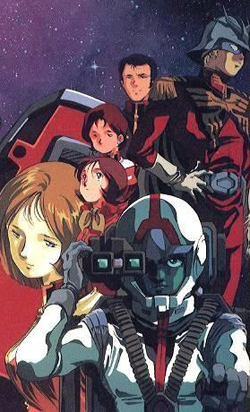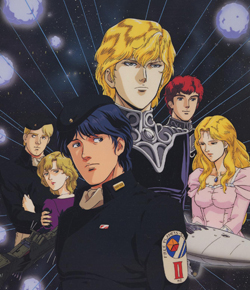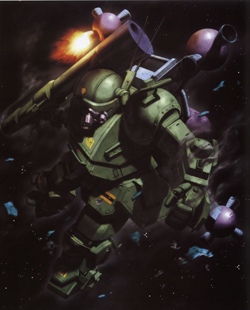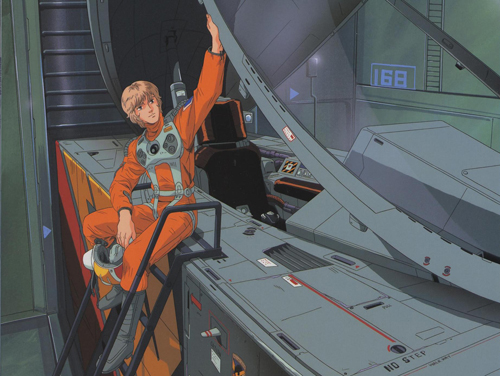With giant battling robots being one of the first images to spring into people’s minds when you mention anime to them, it’s no surprise that military science fiction was for years one of the most popular genres in Japanese animation. In fact there’s so many shows depicting some kind of futuristic—and usually mechanised—warfare that it can be hard to know where to start. Which is why I’ve picked out just four examples—from the action packed and epic through to the dark and philosophical—that I think most military SF buffs will find interesting.

Mobile Suit Gundam
It’s not uncommon to hear people call Mobile Suit Gundam “Japan’s Star Wars,” and in many ways it’s a fair comparison. Both were launched upon an unsuspecting public in the late 70s, both have spawned decades of off-shoots and tie-ins, and both owe a sizeable chunk of their success and longevity to building industries from selling toys, video games and a seemingly never-ending range of assorted merchandise.
Both also share—on the surface at least—similar narratives; young boys struggle along the path of the hero against the backdrop of a decisive conflict. It’s here however that important differences in detail and tone become apparent. The odd personal conflict aside, there is no denying that Star Wars is very black and white in its goodies vs. baddies morality. Things are never quite as clear-cut in MSG, the show’s creator Yoshiyuki Tomino seemingly always striving for more moral depth and ambiguity. For a start the rebels this time are apparently the bad guys—the small Principality of Zeon’s struggle for independence seen as damaging to the stability of Earth. And while Skywalker and son were always too keen to jump into battle, MSG’s teenage hero Amuro Ray is often frightened and reluctant, querying his own ability and role in the war. Everything in MSG is fluid as our perspective shifts from character to character and faction to faction, with the result that it often becomes a discussion of the roles of violence and warfare in human society. It’s this that raises Mobile Suit Gundam above the mere space opera of Star Wars into the realms of real military SF.
That’s not to say it doesn’t have lots of cool geek-fodder too, though. You don’t sell millions of toys for over thirty years without some great designs; Gundam’s giant mecha fighting suits have become one of the iconic images of Japanese pop culture, and nothing beats watching them slug it out with oversized laser canons and great big swords. The animation in the original series (now best consumed in the form of three compilation movies) may look a little dated compared to some of it’s more recent spin-offs, but it has a freshness and energy that they often lack.

Legend of the Galactic Heroes
Based on a series of SF novels by Yoshiki Tanaka, Legend of the Galactic Heroes’ long adaption to animated form started in 1988, and soon became considered the pinnacle of anime’s military SF storytelling. Depicting the interstellar human civilisation of the 35th century, it tells the story of two warring factions through the eyes of two young, enigmatic commanders. On one side is the dictatorship of the Galactic Empire—based loosely on the history of 19th century Prussia—and the ruthless Reinheld Von Musel, and on the other the democratic Free Planets Alliance and the reluctant military genius and historian Yang Wen-li.
Like Mobile Suit Gundam it trades largely on moral ambiguity, but LotGH takes things a stage further by purposefully looking to analyse and contrast opposing political philosophies. Democracy is pitted against dictatorship, with both models having their strengths and weaknesses exposed and dissected. LotGH’s stroke of genius is in how it takes these heavy political concepts and deals with them through the actions and experiences of its two very likable protagonists. Although seemingly polar opposites on paper they both are slowly revealed to be incredibly similar, and dealing with the same conflicts of purpose and method. While Reinhard is often utterly ruthless in his quest for galactic dominance, he is similarly driven by a hatred for the corruption that class and privilege has brought to the Empire. Similarly Yang, a reluctant and foppish philosopher, is a formidable risk-taking strategist, that while prepared to put his and his men’s lives on the line for democracy is disgusted by the corruption, manipulation and opportunism he sees in the Alliance’s political system.
Not that LotGH is just philosophical debate—the true reason for the epically long series’ popularity amongst fans is that its elegant and non-stop story-telling is utterly enthralling. One minute you are watching massive space battles between fleets of thousands of fantastically designed ships, the next war-room clashes or conspiratorial political dealings. All are as engaging as each other.
All of which makes the fact that LotGH has never—and probably never will—received an official English translation or release especially tragic. There is however a brilliant fan-subbed version out there, which is well worth your time tracking down. Despite it’s 100 plus episodes it’s one of the most accessible and familiar feeling works to western SF fans, and a standout example of the space opera and military SF genres in any language.

Armored Trooper VOTOMS
Giant robots and fantastically powered mecha had been a standard feature for decades in anime, but in 1983 Sunrise—the studio made famous by Gundam—decided to bring the genre slightly more down to Earth. It wasn’t the first time he had tried to merge hard SF and mecha, but creator Ryosuke Takahashi arguably got it right with Armored Trooper VOTOMS, a gloriously gritty story of nuts-and-bolts hardware and military betrayal.
VOTOMS opens with the galaxy settling into an uneasy peace after a century long war that has left whole worlds broken and decaying, their people struggling with failing technology and poverty. Our protagonist is a special forces mecha pilot named Chirico Cuvie, who stumbles across a secret whilst on a dubious mission, leading to betrayal from his own commanders and his branding as an outlaw. The series follows the once honoured hero as he goes on the run and attempts to find out the truth as to why he was betrayed.
What makes VOTOMS stand out against the mecha shows that preceded it is its depiction of technology—the galaxy has not only been very clearly ravaged by war, but it is struggling to keep its tech alive. The mecha themselves are some of the most convincing ever depicted, and the whole show has a gritty, junkyard aesthetic that sits comfortably amongst the best of the Mad Max and Alien movies—despite it’s interstellar setting it often feels like a tasty slice of 80s cyberpunk. For those of you that like your military SF hard and dark it’s certainly one to seek out.

The Sky Crawlers
Now for something a little bit different.
It’s perhaps a little surprising that anime auteur and military hardware fetishist Mamoru Oshii (Ghost in The Shell, Patlabor) had never tackled outright warfare until he made The Sky Crawlers. What isn’t as surprising is that when he did, he took such a unique approach. Based on a series of novels by Japanese author Hiroshi Mori, The Sky Crawlers takes its time in revealing it’s true nature to the viewer. Oshii is famous for never rushing his narratives and giving his viewers time to indulge in his slowly paced cinematography, but tSC takes its time in revealing even it’s true setting. Much of the truth about what is happening in the world its characters inhabit isn’t made clear until its final act, and as such it makes it hard to elaborate without drifting into spoiler territory. Simply put, it is set at a time—possibly the future, or equally maybe an alternate past—when humanity has decided that the only way to avoid war is to stage an artificial, and seemingly endless, one. As a result an eternal air conflict is fought between two rival corporations using WWII style fighter planes and bombers, just to fill the war cravings of the global media, economy and watching public.
If eternal, staged war is the formula for survival, then one huge moral question faces the society that puts it into practice: who will do the fighting? For the tSC the answer is the “Kildren,” apparently genetically engineered clones of teenage children, raised to do nothing but fly and fight for the corporations that mass-produce them. It is through their eyes that we slowly learn not only about their world, but also the abusive psychological effect it has on them. Raised to know nothing but war, they fly routine, daily sorties while filling the gaps between with drinking and mindless, detached sex. In fact everything appears detached to them; their lives are so routine—the war so endless—that even the thrills of partying and combat seem to bore them. The fact that they are designed to never age—forever staying young, knowing that they will only, inevitably, die in battle—only compounding their increasing alienation from both each other and the world they are supposedly fighting for.
The movie is often slow and intentionally monotonous—forcing the viewer to sit through the frequently forgotten dreariness of military life, but the opening and regularly punctuating dogfight sequences are perhaps Oshii’s greatest trick. Not only do they break up the mesmerising monotony of watching the Kildren’s routine lives unfold, but they also make the audience participants in their world. The action sequences are so exhilarating, so beautifully choreographed that the viewer ends up almost craving them to return to the screen, and thus becomes the gawping, voyeuristic, war-demanding public of the Kildren’s world, and also the guilty abuser. It’s a masterstroke of manipulation, and a subtle one that perhaps doesn’t truly reveal itself until the films final, bloody dogfight. In terms of pacing and visuals The Sky Crawlers may seem out of place against the other examples of military SF here, but is actually more unique in what it has to say about violence and war.
When he’s not writing about anime Tim Maughan writes science fiction—his critically acclaimed book Paintwork is out now.










